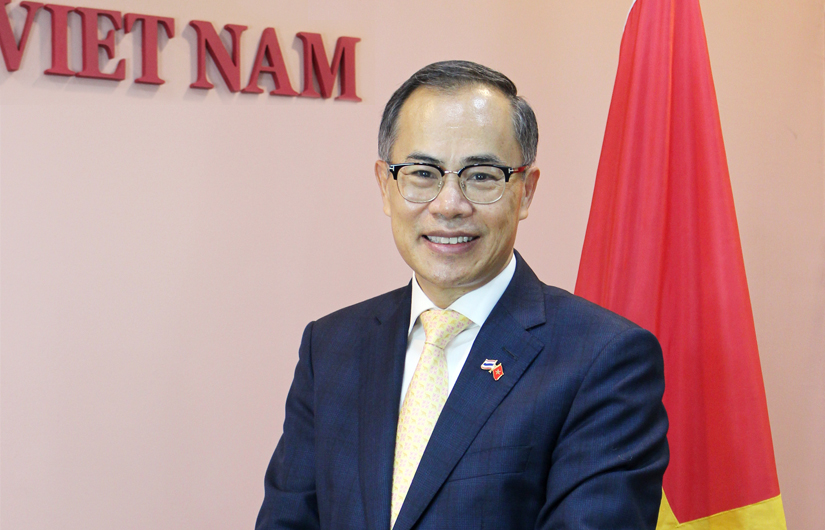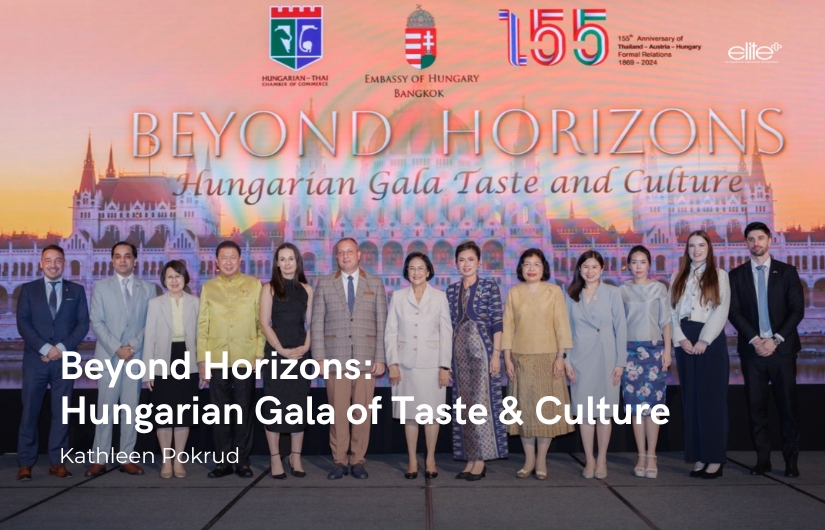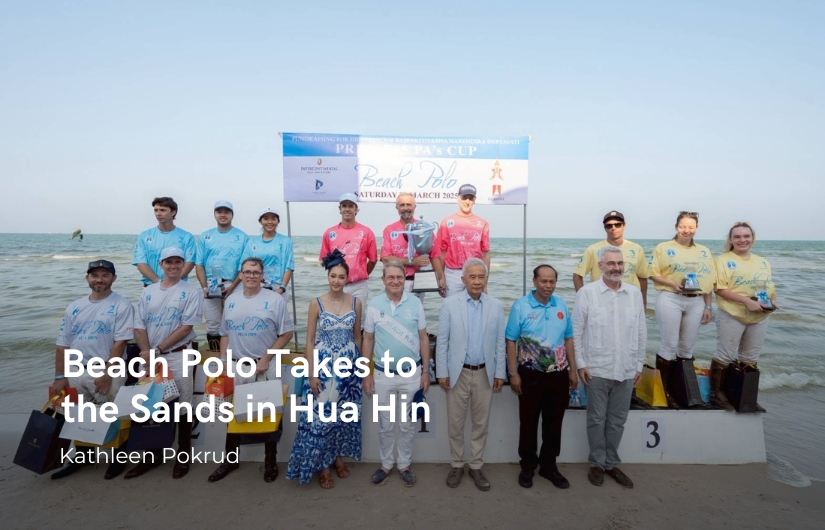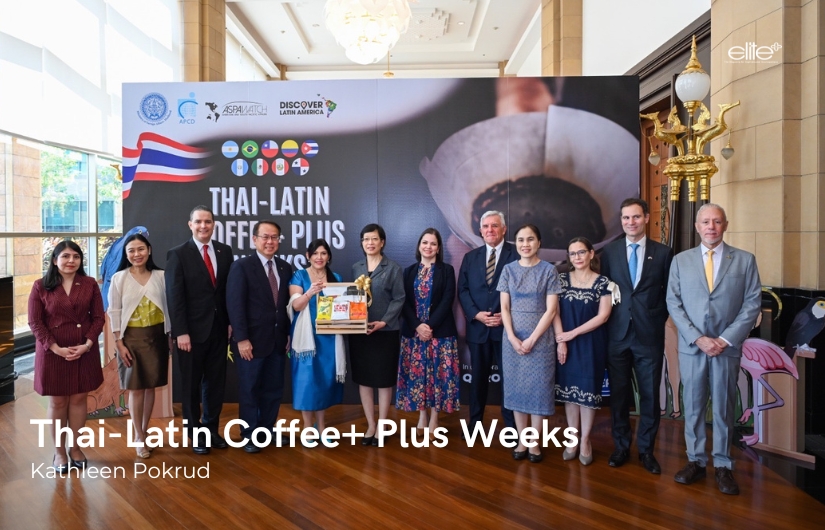HE Dr Phan Chi Thanh, Ambassador of the Socialist Republic of Vietnam to the Kingdom of Thailand and Permanent Representative to UNESCAP, arrived in Bangkok in November 2020. As his posting comes to completion in the next year, Ambassador Phan was kind enough to sit down with Elite+ to discuss what he has been doing to build stronger bilateral relations between Vietnam and Thailand.
Upon completion of high school in Hanoi with merit, Ambassador Phan received a scholarship to study at the Moscow State Institute of International Relations (MGIMO) in the early 1980s. He earned a Master in International affairs from Columbia University, New York and PhD in International relations from the Diplomatic Academy of Vietnam. Throughout his diplomatic career, Ambassador Phan has held various positions in embassies and government offices, mainly dealing with bilateral and multilateral issues including inter-governmental relations, international trade and sustainable development. He also worked at the World Bank
in Washington, DC, as an economic consultant.
Amongst your many positions before assuming the ambassadorship, you served as the Secretary General of the National Council for Sustainable Development and Competitive Enhancement. Could you explain what your responsibilities entailed and how you are incorporating this experience into your endeavours and activities of your Embassy now?
The National Council for Sustainable Development and Competitive Enhancement mainly deals with Vietnam’s national agenda for sustainable development and competitiveness. My experience at the Council has helped me in advocating the Bio-Circular-Green model and Sufficiency Economy Philosophy (SEP), originally introduced by Thailand. Good experience in SDGs’ implementation is also very instrumental for my duty as Permanent Representative of Vietnam to ESCAP.
With the AQI (Air Quality Index) and haze crises that Thailand and Vietnam along with the other member countries of the Mekong River Commission are experiencing, how can your previous work on multilateral issues contribute to helping to solve these problems?
My former duty was to consult and coordinate the relevant agencies in Vietnam to solve the issues of sustainable development, including air pollution and air quality affected by haze. I engaged with stakeholders
in Vietnam, other countries and international organizations to share best practices in the implementation of sustainable development policies and regulations aimed at reducing emissions, improving air quality and addressing the root causes of haze.
To improve AQI in the Mekong region, I think, the issues of transboundary air pollution and haze are very important and require more and more collective efforts by the affected countries through the bilateral and existing regional frameworks such as ASEAN, ACMECS and MRC.
As you arrived in Thailand during the height of the Covid-19 pandemic, how difficult was it for you to perform your duties and what have you been doing since Thailand has removed virtually all restrictions?
I arrived in Thailand in November 2020 amid the outbreak of the Covid-19 pandemic. Such actions as social distancing and restrictions were the biggest challenges for me during my first year here. The Embassy had to switch all activities to so-called “new normal”. Despite the obstacles, the Embassy was quite active and our work program successfully completed by the joint efforts of the Embassy's team. In particular, we succeeded in launching a number of online or hybrid activities with Thai and Vietnamese stakeholders to commemorate the 45th anniversary of the establishment of diplomatic relations between our two countries in
2021.
Since Vietnam and Thailand reopened in mid-2022, the Embassy has returned to normal business. In person diplomatic activities were promoted rapidly, especially visits by leaders of the two countries. The Embassy has also actively facilitated visits of Thai delegations to Vietnam and the Vietnamese delegations to visit Thailand.
As you may know, the most recent activities the Embassy was involved in were the “Thailand Vietnam
Business Forum 2023:1+1=Zero Boundary” orgainized by Thailand Vietnam Friendship Association, the two “Vietnamese Weeks” organized by Central Retail and BJC at Central World and Big C, Hoa Binh Province Business Forum in Thailand and Sky Connection Tourism Forum organized by Vietjet in Bangkok.
What are your roles and responsibilities as your country’s permanent representative to UNESCAP?
The role of Permanent Representative to the United Nations Economic and Social Commission for Asia and the Pacific (UNESCAP) involves representing my country in the commission. My job is also to foster closer cooperation between Vietnam and ESCAP. Among the other responsibilities, I oversee the implementation of UNESCAP resolutions and recommendations within my country, coordinating with relevant authorities and organizations for these purposes.
As Vietnam’s ambassador how involved are you in ASEAN matters?
The ASEAN flag hangs with Vietnam’s national flag in front of the Embassy. This means the Vietnamese
ambassador here in Bangkok has both bilateral and ASEAN responsibilities. In a nutshell, my job is to take care of ASEAN issues here and to get involved in various ASEAN related meetings taking place in Thailand.
It is very important for me to keep close ties with MFA’s ASEAN Department and my fellow ASEAN ambassadors in Bangkok. Friendship and solidarity are key for us in the ASEAN way. We celebrate ASEAN Day together with the Ministry of Foreign Affairs of Thailand every year. I take this opportunity to thank C-ASEAN Center under Thai Beverage for its kind support to ASEAN embassies and the Thai stakeholders and for its leadership in organizing ASEAN Day celebrations.
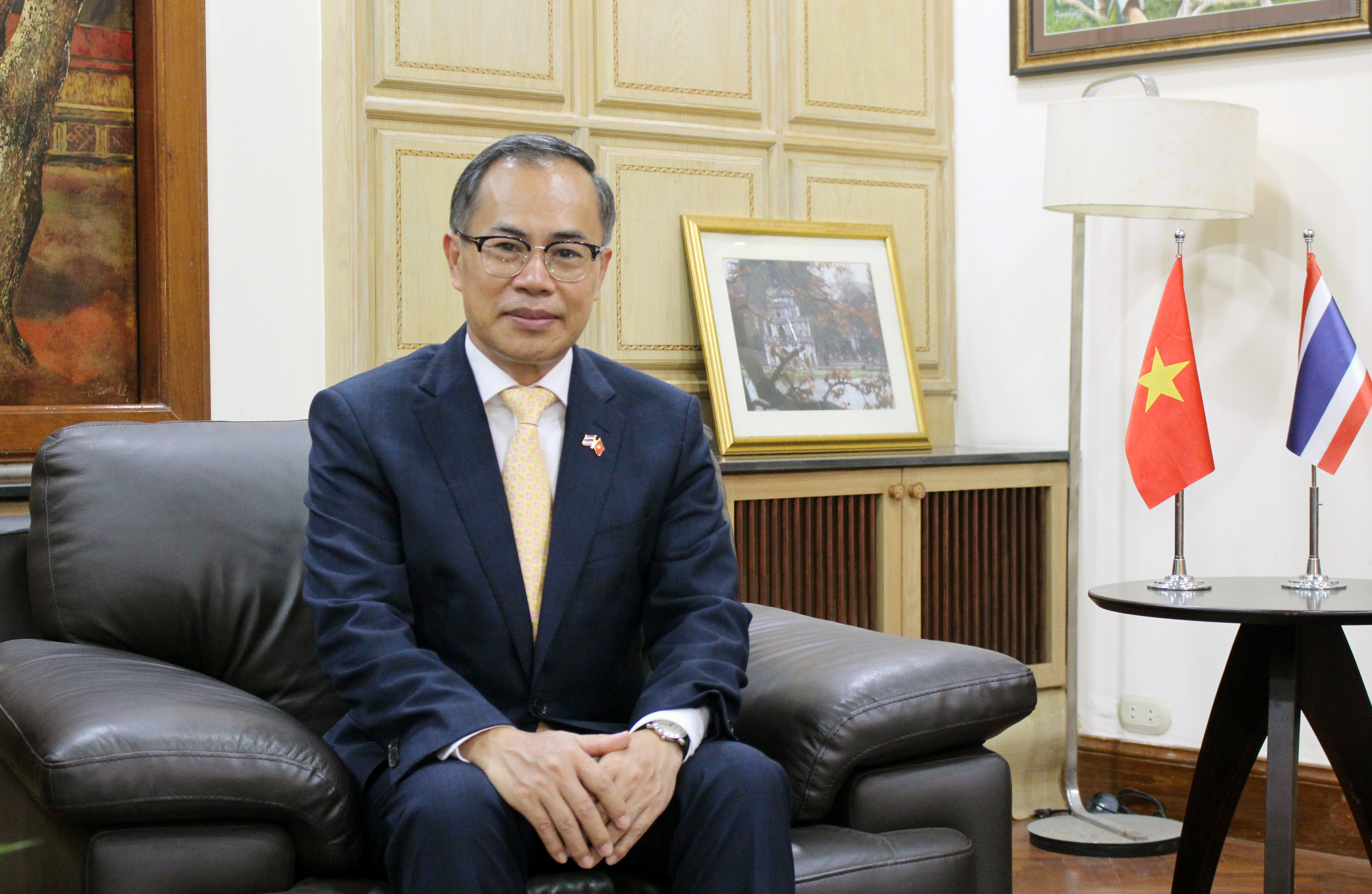
Could you now tell us about the bilateral trade relationship between Vietnam and Thailand?
Trade relations between the two countries have developed rapidly over the past 30 years. The trade turnover in 1992 was only 150 million USD while in 2022 it exceeded 21 billion USD with growth averaging approximately 20% per year during the last 20 years. Our two countries are now aiming for a target of 25
billion USD in 2025. Thailand is Vietnam's major trading partner and ranks first in ASEAN. Vietnam is a major
trading partner of Thailand, for many years in the top five major export markets of Thailand and top 10 import markets of Thailand.
The trade cooperation between Vietnam and Thailand is on a good track of recovery, helping the two countries' economies cope with the adverse impacts of the global economy. Both countries have undertaken initiatives to strengthen trade ties, including joint trade promotions, business forums, trade fairs and exhibitions. Our bilateral trade relationship is an example of taking advanntage of complementary economies in the context of building the ASEAN Economic Community.
What advice would you give Thai entrepreneurs who may be interested in trading with Vietnam
As I said earlier, even though the trade volume has constantly increased for the last 20 years there are still very high potentials and opportunities for trade and investment between Thailand and Vietnam. Geographically, the two countries are located closely and well connected by air, maritime and road transport.
Vietnam and Thailand have a number of trade agreements including the ASEAN Free Trade Agreement ensuring free trade flows between the two countries. The two economies are among the fastest growing in the region and very well complementary in many sectors. Vietnam is a promising and quite big market for Thai exports and imports.
For those who wish to do business in Vietnam my advice is to visit Vietnam first to see the country as well as to meet the people and businesses in Vietnam, to understand Vietnam's business environment, consumer needs and market trends. It is very important to find good partners in Vietnam through business networking or with the help of trade promotion agencies such as the ministries in charge of commerce, the chambers of commerce in Thailand and Vietnam as well as the two embassies. Our Embassy in Bangkok is also a good address to assist the Thai business people who are interested in trading with Vietnam to get connected with Vietnamese partners.
How big would you say the Vietnamese community is in Thailand and what businesses are they involved in?
The Vietnamese community is somewhat over 100,000 people living mostly in the North-eastern provinces of Thailand. The Vietnamese community is one of the oldest foreign communities in Thailand. With the support of the Royal Thai Government as well as the provincial governments, the Vietnamese community has become an integral part of Thai society and has been contributing largely to the development of the provinces of their residence. Many Thai Vietnamese have succeeded in careers as doctors, teachers, farmers, public servants, business people and community activists… Most of them are strong supporters to build friendship between the two peoples.
In general, Vietnamese people are very hard-working and determined in doing business. A lot of Vietnamese are successful as entrepreneurs. They do different kinds of business, including farming, manufacturing, trading and providing services. The Thai-Vietnamese business community has established the Thai-Vietnam Business Association. One of the objectives of the association is to foster cooperation between businesses of Thailand and Vietnam.
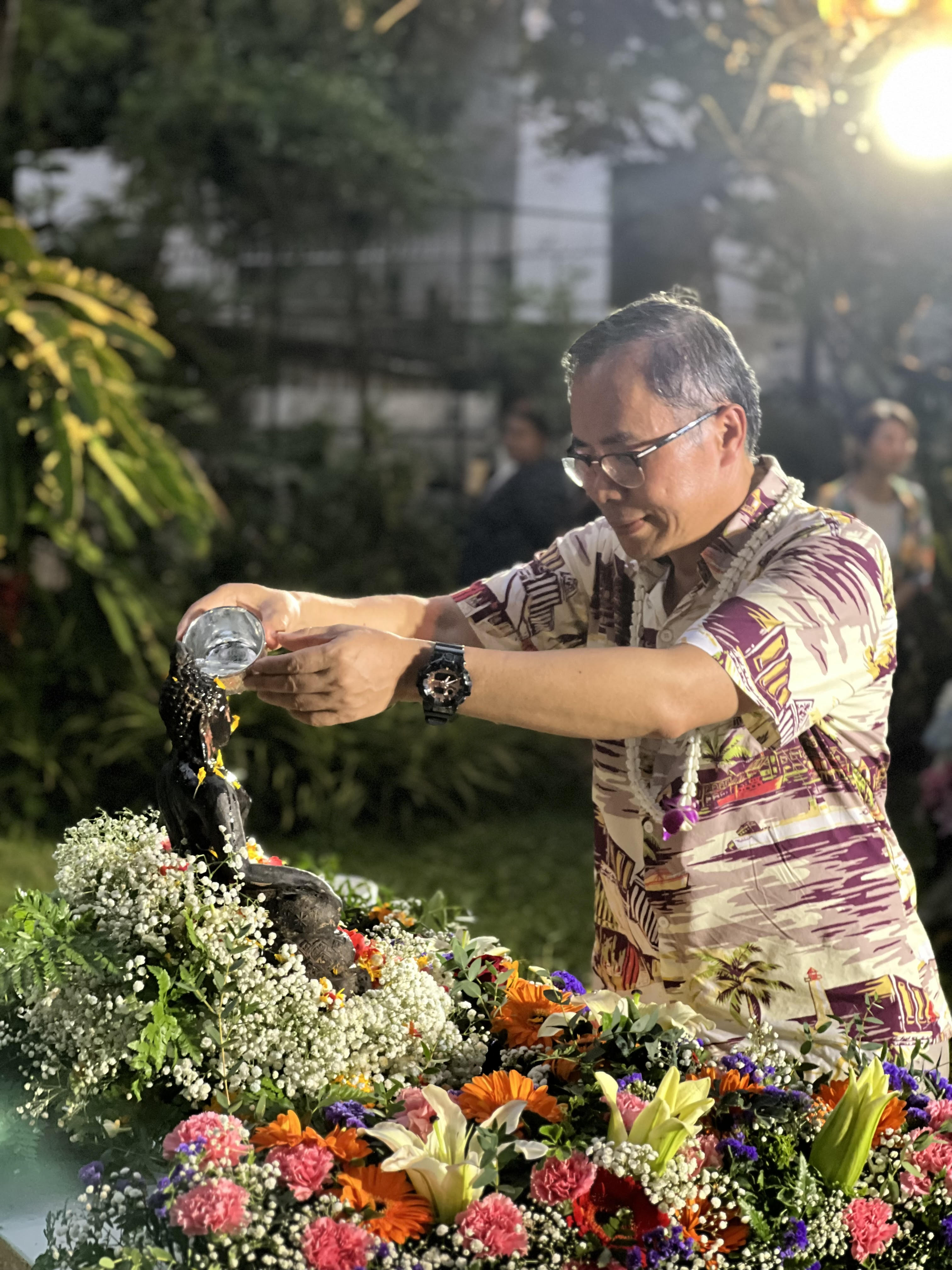
As you have now spent well over two years in Thailand, what has impressed you most about the country and its culture?
I have visited more than 30 provinces, some very well known for their rich cultural heritages. Thailand boasts a rich culture, with stunning temples, intricate architecture and traditional performances. The combination of ancient traditions and modern influences creates a unique cultural tapestry.
There are a lot of amazing things in Thailand. I have experienced stunning Thai festivals like Songkran and Loy Krathong. My family loves Thai cuisine and enjoys many spicy dishes, with fresh ingredients and aromatic spices.
Thai and Vietnamese cultures share many similarities such as respect for elders, upholding family values and preservation of traditional cultures. Buddhism plays a significant role in both cultures, which is reflected in the temples, rituals and festivals. In both Vietnam and Thailand, where both peoples emphasize polite and respectful behaviour. They communicate with decorum, use honorifics and avoid confrontational language or actions. Both countries are known for their diverse and flavourful cuisines. Tourists can also find similarities in street foods in both countries.
To conclude, do you have any final thoughts you would like to share with our readers?
I would like to take this opportunity to thank them Royal Thai Government, the public and private sector for their valuable support given to our Embassy and myself during my tenure in Thailand. This year marks the 10th anniversary of the strategic partnership between Vietnam and Thailand. I want to reassure the Elite+ readers that Vietnam-Thailand relations are stronger than ever with significant achievements in all areas. Finally, we are not competitors; we are good friends and long-term partners and will work closely together for the benefit of our two peoples and for the peace and prosperity of Southeast Asia and the world at large.


